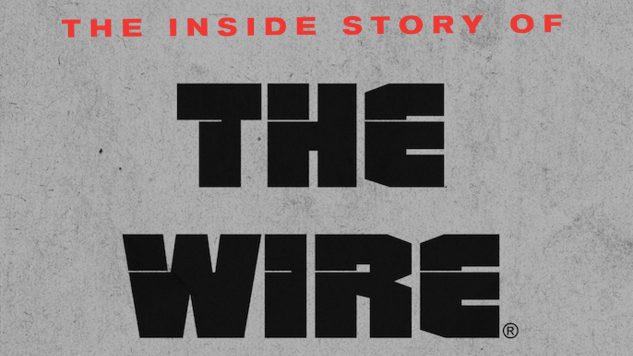All the Pieces Matter: Why There Will Never Be Another TV Show Like The Wire

In June 2001, one year before The Wire joined the slate of series—Oz, The Sopranos, Sex and the City, Six Feet Under—by which HBO helped birth what’s since become known as “the golden age of television,” creator David Simon wrote a memo to the network’s chairman and CEO, Chris Albrecht, and its president, Carolyn Strauss, outlining the main thrust of The Wire. “The journey through this one case,” he explained, “will ultimately bring viewers from wondering, in cop-show expectation, whether the bad guys will get caught, to wondering instead who the bad guys are and whether catching them means anything at all.”
Simon, then fresh off his HBO miniseries The Corner (2000) and NBC’s now-classic Homicide: Life on the Street (1993-1999)—both based on books that had grown out of his long career as a reporter at the Baltimore Sun—turned out to be as good as his word. In the course of its five seasons, each built around a single institution (the police, the docks, City Hall, the schools and the media, respectively), The Wire transformed the “cop show” into a kaleidoscopic portrait of the American city, one that’s mentioned in the same breath as Dickens almost as often as it is Hill Street Blues or NYPD Blue. It counts, for many critics (this one included), among the two or three finest TV dramas ever made. It is also, as becomes clear from Jonathan Abrams’ excellent oral history of the series, All the Pieces Matter, sui generis: There will never be another TV show quite like The Wire.
Compiled from in-depth interviews with Simon, co-creator Ed Burns and a full complement of actors, writers, directors, cinematographers, researchers and other crew members on the series—which Abrams arranges, roughly speaking, into narratives of the series’ development, each of its five seasons, and its enduring legacy—All the Pieces Matter renders the making of The Wire in enough rich detail to please even its most ardent fans. (To wit: Michael K. Williams, better known to viewers as the enigmatic Omar Little, discovered actress Felicia “Snoop” Pearson at a Baltimore nightclub shortly after she finished a seven-year prison term for second-degree murder.) But it’s the time capsule aspect Abrams captures, of The Wire as a product of its particular moment, that may be the book’s most illuminating feature. It is, among its other merits, that vanishingly rare thing: an honest treatment of the fraught relationship between TV as business and TV as art.
 It’s worth remembering that, with a handful of exceptions—the live dramas of the 1950s, for instance, or the sitcoms of the 1970s—the notion that TV even qualifies as an art form worthy of in-depth consideration, criticism, argument and analysis has only become widely accepted relatively recently, at least in comparison to the medium’s age. As Abrams suggests, The Wire was instrumental in this process, burnishing its reputation, and the medium’s, through its association with literary figures. It’s no wonder the series draws so many comparisons to literature; in both the writers’ room (George Pelecanos, Dennis Lehane) and the media (Stephen King, Lorrie Moore), novelists have been as important to cementing its legacy as TV critics. In fact, The Wire’s most enduring influence, which it shares with The Sopranos, Breaking Bad and Mad Men, might be in establishing the template for “serious” television: complex, serialized narratives, often inflected with elements of the crime drama; brooding, antiheroic male protagonists; frank depictions of sex and violence; and an embrace of moral ambiguity.
It’s worth remembering that, with a handful of exceptions—the live dramas of the 1950s, for instance, or the sitcoms of the 1970s—the notion that TV even qualifies as an art form worthy of in-depth consideration, criticism, argument and analysis has only become widely accepted relatively recently, at least in comparison to the medium’s age. As Abrams suggests, The Wire was instrumental in this process, burnishing its reputation, and the medium’s, through its association with literary figures. It’s no wonder the series draws so many comparisons to literature; in both the writers’ room (George Pelecanos, Dennis Lehane) and the media (Stephen King, Lorrie Moore), novelists have been as important to cementing its legacy as TV critics. In fact, The Wire’s most enduring influence, which it shares with The Sopranos, Breaking Bad and Mad Men, might be in establishing the template for “serious” television: complex, serialized narratives, often inflected with elements of the crime drama; brooding, antiheroic male protagonists; frank depictions of sex and violence; and an embrace of moral ambiguity.
All the Pieces Matter adds a fascinating wrinkle to this narrative, not because Abrams casts doubt on the series’ greatness, but because the picture that emerges is one in which “greatness”—the arc from pilot episode to best TV series of all time—is contingent on an almost infinite number of factors, from financial considerations and casting decisions to critical reception, timing and plain dumb luck. As the seasons wore on, for instance, HBO nearly axed The Wire not once, but twice-first after Season Three, with the death of Idris Elba’s charismatic Stringer Bell, and second after Season Four, a portrait of Baltimore public schools that counts, for me, as the series’ finest. In their recollections, Simon and Albrecht’s delicate pas de deux as the series clung to life assumes dramatic momentum of its own. There are offers and counteroffers (Simon ultimately accepted a reduced order of 10 episodes for Season Five); questions about ratings (Season Three averaged an anemic 1.9 million viewers per episode); even the suggestion of a spinoff (it was to follow Aiden Gillen’s Mayor Tommy Carcetti and be titled The Hall). Which raises the question: If The Wire lasted only three seasons—had it come to represent an iteration of the “cop show,” albeit a brilliant one, rather than the genre’s wholesale deconstruction—would we still call it “great”? Had any of the pieces been pulled from the puzzle, would The Wire as we know it even exist?
Such counterfactuals are for friendly barroom arguments more than thoughtful criticism, perhaps. But in demystifying “greatness,” in underscoring the fact that the term is most often applied to art in retrospect, All the Pieces Matter offers a reminder that the very definition of “greatness” is itself circumstantial, subject to shifting mores, changing tastes, industrial constraints, popular interests; it is as contingent as the set of interwoven choices that result, on our end of the bargain, in the cultural artifact known as the “TV show.”
I should note that my point here isn’t contrarian, as least as it relates to The Wire. I remember watching it for the first time in 2009 (as a 22-year-old educator at an alternative school an hour outside New Orleans) and seeing in Season Four—most especially Jim True-Frost’s cop-turned-teacher, Roland Pryzbylewski—the only truthful representation of the experience I’d seen or have seen since.
My point is that our understanding of “greatness” on TV, of “serious” television, still hews more or less closely to the hermeneutic that developed in response to The Wire—even though, as Abrams’ narrative suggests, the confluence of factors that made The Wire what it was are no longer operable. The kind of metro reporting on which Simon cut his teeth and developed his worldview is, if not dead, then at least on life support, wrung dry by the advent of digital media. I can count the number of outlets at which it’s possible to square space for the in-depth, long-form journalism that led to Homicide and The Corner, on the page and thence on screen, on two hands. The proliferation of primetime scripted series has made it harder for any one TV show to break through—and that includes countless examples less challenging to the viewer than The Wire. The DVD (later streaming) long tail by which the series finally found its audience, and by extension its afterlife, is more cluttered with titles than ever before; social media and the sheer volume of television have shortened the shelf life even of TV series upon which critics lavish praise. The rise of streaming militates against series that benefit from a week’s digestion; the popularity of Game of Thrones has moved HBO and other networks to bank on fantasy epics and Reddit-ready puzzle boxes. The obsession with pre-sold properties and comic book characters, with remakes, reboots and revivals, means that something as original as The Wire, as difficult and dense, as truly, thoroughly, unapologetically, unforgettably sui generis, has fallen out of fashion.
There’s no guarantee it’ll come into fashion again.
My point, per Abrams’ superb treatment and Clarke Peters’ methodical detective Lester Freamon, from whom the book takes its title, is that all the pieces really do matter: “Greatness,” on television, is the result of the collaboration of artists, executives, critics and fans, of money and people, ratings and reception, perfect timing and pure dumb luck, to the extent that the particular magic of The Wire, already attempted by many, will be recreated by none.
The best TV show of all time? Long may it reign.
Matt Brennan is the TV editor of Paste Magazine. He tweets about what he’s watching @thefilmgoer.







































